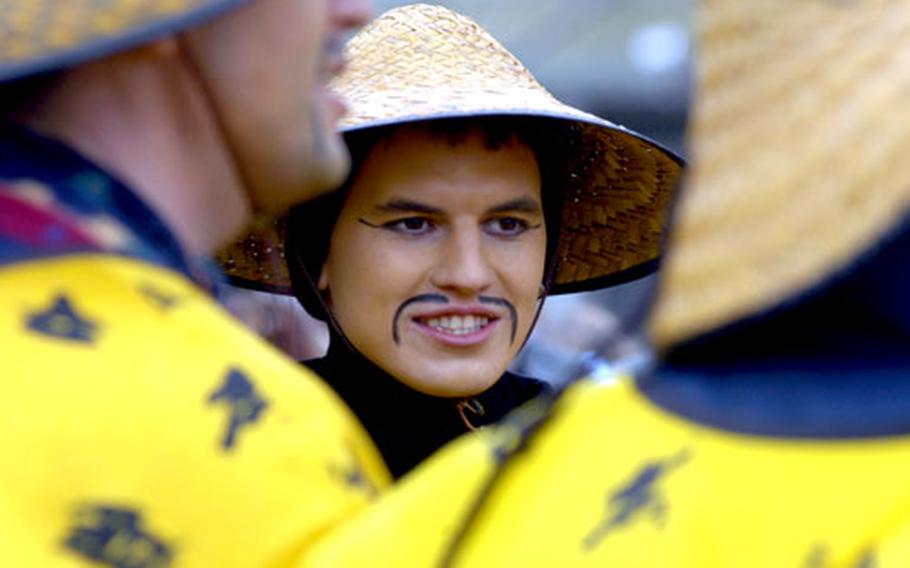
A member of a group of Chinese-themed revelers gets ready to sing on a main street in Dietfurt, Germany, after last year’s Chinesenfasching parade. (Ben Murray / S&S)
In the center of a snowy burg in the middle of Bavaria, the citizens of Dietfurt appear to have a problem: They cannot seem to find the Chinese emperor.
Standing on the steps of a cobbled-together re-creation of a Buddhist temple on a chilly February day, two men in Asian-style robes gaze over the city skyline, pointing past the rooftops, shielding their eyes from the sun.
The emperor, it seems, will be flying in for today’s appearance, a concept that may sound absurd until the royal figurehead actually shows up, descending through the roof of the temple on a glittering platform, sparks flying from beneath his feet.
While the arrival of a foreign dignitary on a golden dais does present a striking scene, given the setting — Dietfurt is a perfectly postcard-worthy little town in the rolling hills of Bavaria — the event is just one peculiar piece of a unique part of the German Fasching season.
Held each year on the Thursday before Ash Wednesday, Chinesenfasching is much like a traditional German carnival parade, but with a distinctly Asian flavor.
The town’s central square is draped with bright yellow banners festooned with Chinese characters. Clothing store windows are filled with brightly colored Chinese robes and residents temporarily rename their businesses with titles like The China Bar.
Combined with the typical costumed revelry of a Fasching parade, the Dietfurt festivities are a Bavarian oddity that provide hours of entertainment, starting with a traditional parade and running through the one-of-a-kind induction of a ceremonial emperor.
The story of how a small German town became a bastion of Chinese culture has, perhaps fittingly, almost no connection to China and came about mainly through a disagreement over money.
According to the flier distributed by the local tourism office, the Chinesenfasching got its start about 150 years ago, following the town’s falling-out with a nearby bishop, who determined that the people of Dietfurt weren’t paying enough in tithes to the church.
When residents of the then- walled city got wind that a tax collector had been dispatched to the town, so the story goes, the citizens simply closed the gates against him and waited for him to leave, sending the man away without a collection.
Reporting back to the bishop, the chagrined tax collector described the Dietfurt people as having what he viewed to be a Chinese tendency to wall themselves in and patiently wait out unwanted guests. The description stuck.
In its modern translation, the Dietfurt Chinesenfasching involves a popular parade that draws more than 1,000 spectators, followed by the resplendent (though prolonged) pageant on the temple steps, which tells the story of the jilted tax man and includes the operatic arrival of the year’s chosen Emperor.
Throughout the day, the crowd is prompted to shout the local Fasching greeting with a yell of Ki-li, followed with the response, Vau! usually repeated three times in quick succession.
To attend, spectators must buy a ticket — 2.50 euros last year — at one of the downtown area’s two main access streets, blocked off for the celebration by a pair of re-created wooden gates.